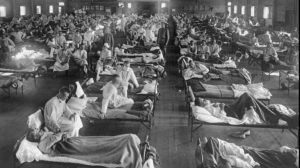Elizabeth Outka
Reverberations Into the Future
April 11, 2020The Paris Review
How Pandemics Seep into Literature
‘The literature that arose from the influenza pandemic speaks to our current moment in profound ways, offering connections in precisely the realms where art excels: in emotional landscapes, in the ways a past moment reverberates into the present, in the ineffable conversation between the body’s experiences and our perception of the world.
Right now, every few days brings another reality into focus; what seemed far-fetched yesterday arrives tomorrow. The past is always another country, but the speed at which knowledge becomes outdated, naivete turns to realization, and basic truths change is dizzying during a pandemic.
One’s reality doesn’t simply shift in a pandemic; it becomes radically uncertain—indeed, uncertainty is the reality. The unpredictability of the COVID-19 virus and all we don’t know about it means we have no idea where we are in the story or even what story we are in. Is this the first wave of something even deadlier to come? Have we reached the top of the curve? What’s the scope of the tragedy? Is the economy the real story? What do we think we know now that may prove fatally wrong? The narrative uncertainty causes many of us to turn to genre fiction and predictable movies (even if they are about disaster)—they allow us to pull down another story like a shade and sit in a place where we already know the ending.
And finally, there comes the aftermath, both for our bodies and for our culture. How do such experiences live on in the cells, in the memory, in the streets? The continued sense of living death, of an experience that marks us with its shadow, echoes even after a pandemic passes. Woolf’s Mrs. Dalloway, so often read as a novel capturing the aftermath of war—which it most certainly does—also records in its title character the physical and mental exhaustion that lingers after an illness. Like Woolf, Clarissa Dalloway has heart damage from her encounter with influenza, and as she moves through the streets of London and at home, she sees her world through her sense of bodily vulnerability, her very heartbeat and its lags pulsing through the memories of her illness. The sights and sounds and smells of the sickroom float back through her consciousness, shifting the ways she perceives the London day. Whether in illness or in observation, our own bodies are busy now. They are recording our pandemic, setting in place the reverberations that will echo into our future.’
Full read:
